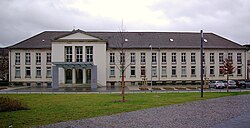Hans Lerch (entrepreneur)
Hans Lerch (born February 19, 1896 in Mainz as Johannes Hans Lerch , † November 8, 1958 in Montreal ) was a German industrialist and Royal Yugoslav Consul General .
Life
After the First World War , Johannes Hans Lerch founded the wholesaler for technical articles JH Lerch & Co. in Hanover during the Weimar Republic in 1921 , which soon developed "[...] into one of the largest companies of its kind".
In 1928 Lerch was appointed Royal Yugoslav Consul General.
After Lerch had already held the majority of the shares in Hanomag in the early 1930s and had also managed the company, the majority of shares in MIAG Mühlenbau und Industrie AG passed from Dresdner Bank to Lerch in 1935 .

Lerch headed Hanomag until the early 1930s
The administration building built by Adolf Springer in 1935 for the JH Lerch company , later the seat of the Lower Saxony Prime Minister in the Lower Saxony State Chancellery
Former foundry of MIAG Mühlenbau und Industrie in Braunschweig
For the time of National Socialism and the Second World War , the name Lerch is found several times in connection with forced laborers , partly in connection with the Braunschweig armaments command .
After the war - as a result of which the branches of the JH Lerch company in Leipzig , Vienna and Hamburg were lost - Hans Lerch rebuilt MIAG Mühlenbau und Industrie GmbH based in Braunschweig and, not least through his personal initiative, made it world-famous.
On March 16, 1953, the Braunschweig University of Applied Sciences received a doctorate “[...] in recognition of his services to the German economy, the owner (sole shareholder ) of MIAG Mühlenbau und Industrie GmbH., Hanover, Consul General JH Lerch” as Dr.-Ing. E. h. as well as an honorary senator .
In the 1950s, Johannes Hans Lerch also worked as a consultant for industrialization issues in Canada , "[...] which enabled the German economy to export well-known".
In the mid-1950s, the headquarters of JH Lerch & Co. GmbH was located in the company's own building at Planckstrasse 2 and 3 in Hanover, which later became the seat of the Lower Saxony Prime Minister in the Lower Saxony State Chancellery . The building was bought by Prime Minister Alfred Kubel during the reign of Prime Minister Alfred Kubel after plans to build a state chancellery on Waterlooplatz had failed.
After Lerch's death , his widow emigrated to the USA and sold the majority of the shares in MIAG to what had previously been the strongest competitor for decades , the Swiss Bühler brothers .
Literature (selection)
- Helmut Plath , Herbert Mundhenke , Ewald Brix : JH Lerch & Co., GmbH, Hanover , in this: Home chronicle of the capital Hanover Home chronicle of the cities and districts of the federal territory , (Vol. 17), Cologne: Archive for German home care, 1956, P. 443f.
-
Braunschweigisches Industrie- und Handelsblatt.
- Born 1956, p. 97.
- Born in 1958, p. 528 f.
Archival material
Archives can be found among other things
- in the university archive of the Technical University of Braunschweig under the register number B2 116.
Remarks
- ↑ Deviating from this, Vladimir Gutowski (sd) named 1934 as the year when the majority of shares in Hanomag were transferred.
Individual evidence
- ↑ a b c N.N. : New archive for Lower Saxony , vol. 6, Bremen-Horn: Dorn, 1953, p. 394; books.google.de (preview).
- ↑ City Chronicle Braunschweig. braunschweig.de, accessed on January 27, 2016 .
- ↑ a b Holdings ( Memento from June 26, 2013 in the Internet Archive ) (PDF) of the Braunschweig University Archives .
- ↑ a b c d e f g Helmut Plath, Herbert Mundhenke, Ewald Brix: JH Lerch & Co., GmbH, Hanover , in this: Home chronicles of the capital Hanover Home chronicles of the cities and districts of the federal territory , (Vol. 17), Cologne : Archive for German Homeland Care, 1956, p. 443f.
- ↑ a b c Vladimir Gutowski (responsible): Description of lot number 610 ... MIAG Mühlenbau und Industrie AG in the catalog for the 38th auction of historical securities on August 4, 2008, last accessed on January 25, 2016.
- ↑ a b Gudrun Fiedler , Hans-Ulrich Ludewig (ed.): Forced labor and war economy in the state of Braunschweig. 1939–1945 (= sources and research on Braunschweigische Landesgeschichte , vol. 39), published on behalf of the Braunschweigischer Geschichtsverein. Braunschweig: Appelhans, 2003, ISBN 3-930292-78-5 , pp. 27, 45, 62; Preview on the website of Appelhans Verlag
- ↑ Compare the imprint on the stk.niedersachsen.de page , last accessed on December 30, 2016
| personal data | |
|---|---|
| SURNAME | Lerch, Hans |
| ALTERNATIVE NAMES | Lerch, Johannes H .; Lerch, JH |
| BRIEF DESCRIPTION | German chairman of the supervisory board, consul general and business leader |
| DATE OF BIRTH | February 19, 1896 |
| PLACE OF BIRTH | Mainz |
| DATE OF DEATH | November 8, 1958 |
| Place of death | Montreal |


